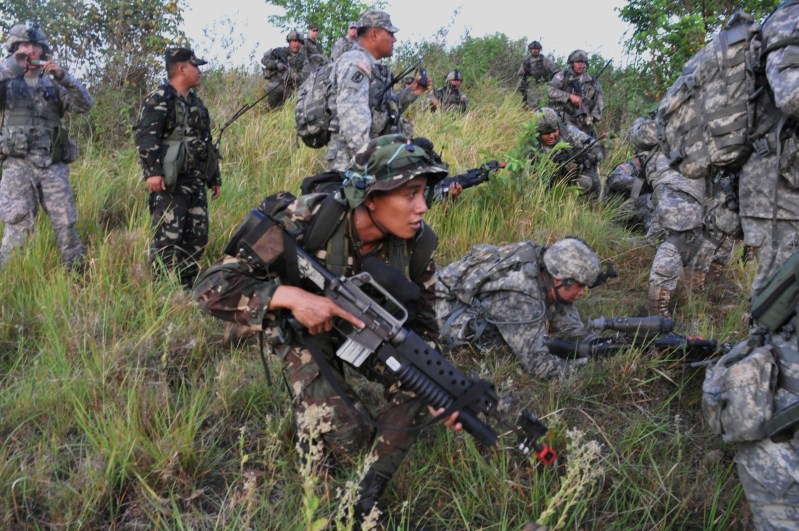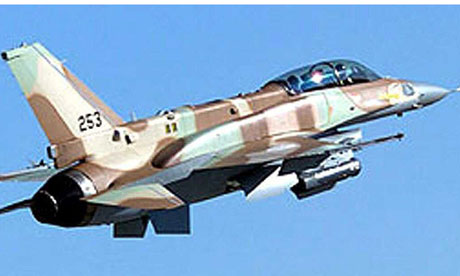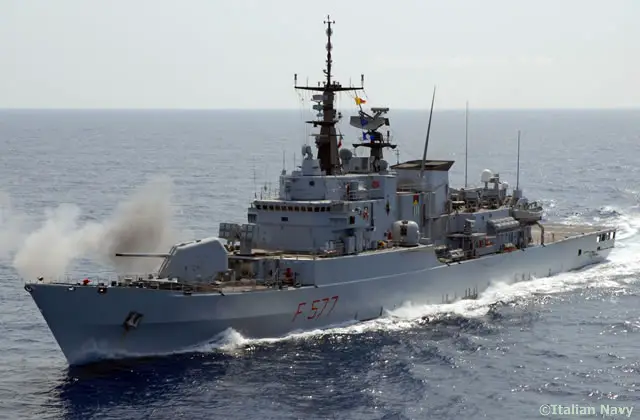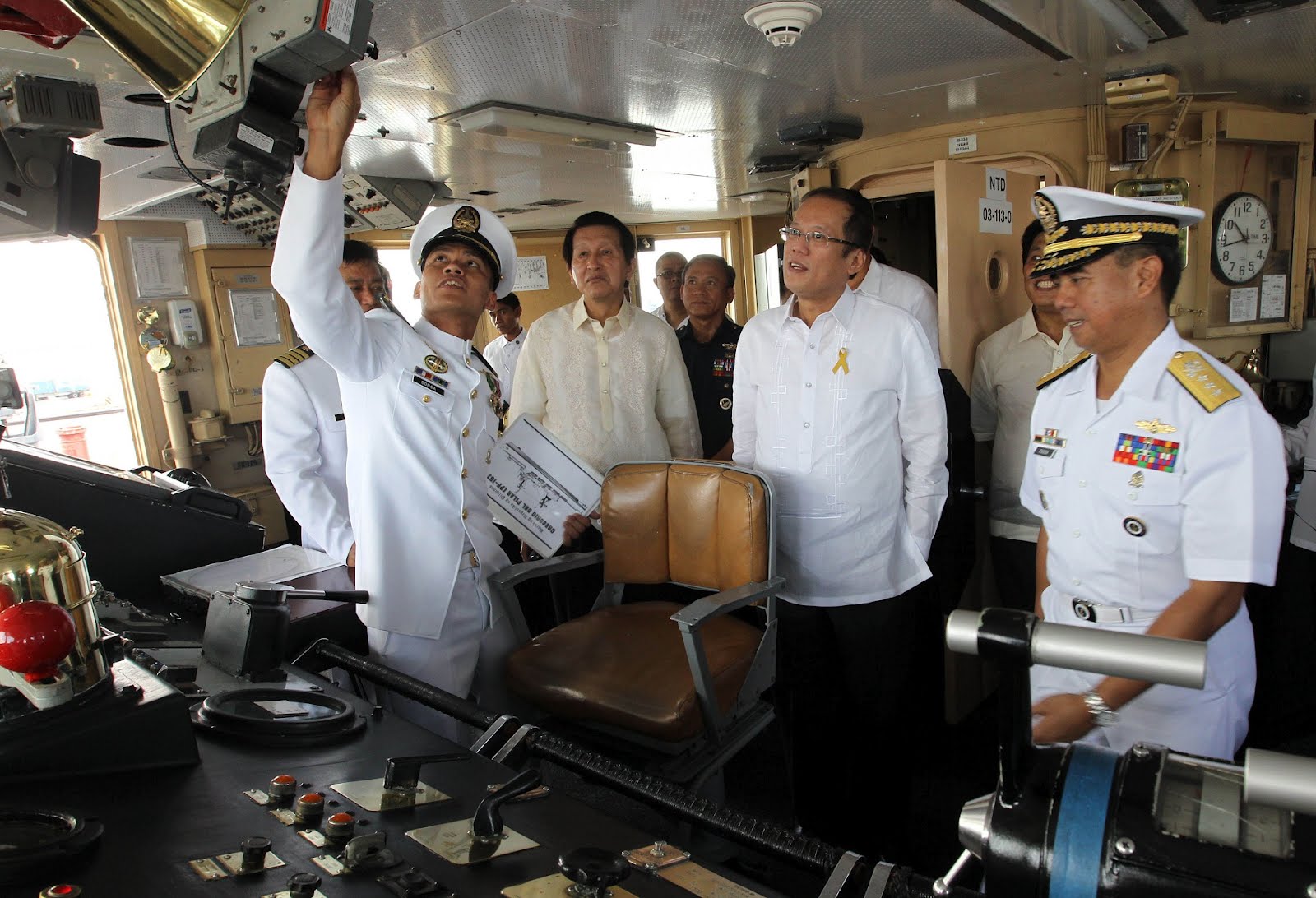The US is helping the Philippines to modernise and improve its military capability in the face of a growing confrontation with China over supremacy in the South China Sea.
The Americans have already agreed to transfer two naval vessels to an underpowered Philippine navy, and deployment of fighter jets, a coastal radar system and even increased numbers of American troops on the ground in the Philippines are under discussion.
The Philippines has several territorial disputes with China in the South China Sea, and while all sides know its armed forces will never be a match for China, the military moves are designed to give the country a "minimum credible defence position", officials say.
The US has transferred to its Pacific ally two decommissioned coastguard ships. The first, the Gregorio del Pilar, arrived August 2011 and replaced a second world war vessel as the Philippine navy's biggest and newest ship. The second is expected to arrive this year.
Officials familiar with defence and security policy have told the Guardian this may be the beginning of an era of greater military co-operation. Rodolfo Biazon, chair of the Philippine house committee on national defence, told the Guardian there were plans to buy "big-ticket items for the air force and navy".
Lieutenant Colonel Miko Okol, spokesman for the Philippine air force, says surface attack aircraft, attack helicopters, long-range patrol aircraft and radar are among the items already approved for purchase and soon to be put up for bid. He says, "I cannot give you a specific, like a specific aircraft, or what country we're gonna get them from. But these are the things we will be getting in the next two or three years."
A request for a squadron of F-16 aircraft has been made to US defence officials, but Okol is unsure of where it will lead: "We have told officials we would like to get these items as part of the things we might ask them [for] in terms of our defence co-operation with them".
The Philippines may also receive help in upgrading its military equipment from US allies such as Japan, South Korea and Australia. Ricky Carandang, the presidential communications secretary, says that talks are being held with Japan to acquire 12 patrol boats for the coastguard. The US is also understood to be considering increasing its troop presence from current levels of around 600.
The developments come as the scramble intensifies for control of the South China Sea, a crucial expanse of ocean with coastline in China, Vietnam, the Philippines, Taiwan, Malaysia and Brunei.
China has been asserting its military power in recent years, claiming territorial rights over Scarborough Shoal and other island groupings deep in the 200-mile maritime exclusion. Smaller regional powers have felt cowed in the face of a superpower flexing its muscles, and are turning to the other global superpower for support.
But Carandang says territorial issues are not the main reason for the drive to upgrade military capability. "If you look at our configurations, there is always a focus on primarily fighting internal threats since the late Marcos era," he explains. "Basically, we have allowed our external defence capabilities to deteriorate. Whether or not there was an issue with China, there was that need and the president recognised it."
Prof Rommel Banlaoi, vice president of the Philippine Association for Chinese Studies, mentions the other threats which would be reasons for the country to build up its maritime domain: "It can also mean against other international terrorist groups, maritime pirates, smugglers of arms, drug smugglers, human traffickers, and other forms of transnational organised crimes using the South China Sea, the Celebes Sea, the Sulu Sea."
But Banlaoi says access to the sea lanes in the South China Sea is also an issue. Although the US says it does not take a position on competing territorial claims, it does have an interest in maintaining freedom of navigation in the area for American ships, whether military, civilian or commercial.
"In my opinion the US is doing this because of the China challenge," says Banlaoi. "Of course it will not admit it – the US also has interests in keeping a cordial relationship with China as an economic power. The US fears that if China increases its influence in the area then it will affect the unhampered use of the waters in the South China Sea."
According to Banlaoi, the support given to America's former colony is part of President Obama's "pivot towards Asia" is an attempt to strengthen all its existing alliances in Asia- including Australia, Japan, South Korea and Thailand.
Banlaoi says that the Philippines needs the assistance most: "Among American allies in Asia the Philippines is the only country with no credible capabilities. We are very ill equipped, in fact the Philippines is what I call belonging to the weakest link in the US alliances in Asia."
The United States is also assisting the Philippines with a system to better monitor the archipelago's Western coast. Details as to the timeframe of such a project are unclear but according to Carandang, "It's going on ..its moving, it's happening."
Rep. Biazon details the form such assistance might come in: "You need not only the radar systems, but including communication systems. You can't operate the aircraft without a radar. That will be part of the package. And probably even armaments."
But debate exists as to whether or not these efforts to modernize the military with new equipment will really make a difference.
Neri Colmenares, party list representative for the leftist Bayan Muna movement, believes efforts to make Philippines defence "credible" are in vain and will only serve to increase dependence on the US: "We can spent a hundred years' budget on the armed forces of the Philippines and it will not make our defence credible against China," he says. "An increase in budget or capabilities is not the way forward … because the armed forces itself has not been reformed. It's still a corrupt and politicised body."
Academics such as professor Benito Lim, a China specialist who teaches political science at Ateneo de Manila University, questions the sincerity of American help, pointing out that China's defence system is stronger than all the military weaponry of the Asean countries combined.
Referring to the Gregorio del Pilar, which was stripped of most of its weapons, he says: "Suppose the Americans know that China owns a machine gun, but they give the Philippines a kitchen knife – it makes the Philippines look ridiculous when confronted with the Chinese in the Scarborough Shoal.
"Suppose they see Chinese ships enter the area of the contested islands. What can the Philippines do? Can they drive them out? They will probably just to do what they are doing now – say 'The Chinese are bullying us!'"



















